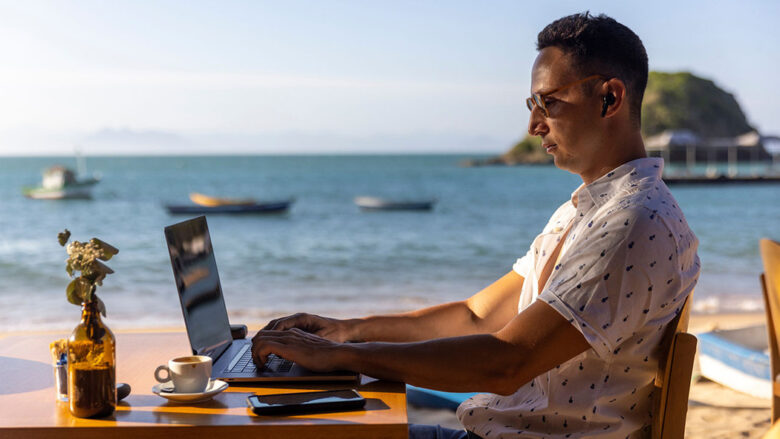As a digital nomad, you can work from a beautiful beach, a bustling café, or a peaceful mountain retreat. But this freedom also means you must strive to stay productive. Distractions, burnout, and an unpredictable work environment can lead to frustrating declines in productivity that hinder your progress. Being a successful digital nomad requires more than just time management. You also need to maximize your energy, attitude, and workflow. This guide will show you practical, research-based methods to help you get back on track during a productivity slump, stay inspired, and perform at your best, wherever you travel.
How to Understand a Productivity Slump:
When you’re in a productivity slump, you lose focus, motivation, and productivity. Digital nomads may experience these dips due to fatigue from long travel, loneliness, or a lack of a consistent schedule. Research from the Harvard Business Review shows that cognitive overload and decision fatigue are two of the leading causes of decreased productivity. The first step to solving the problem is identifying the root cause. The cause could be mental exhaustion, a lack of clear goals, or a poor work-life balance.
Create a Structured Schedule:
Losing order is one of the worst things digital nomads can do. Flexibility is excellent, but a lack of a consistent routine can lead to procrastination. Research shows that highly productive people adhere to daily rituals, such as waking up at the same time and making time for deep work. Set consistent work hours, schedule breaks, and use time-blocking techniques to get things done. Tools like Toggl and Google Calendar can help you stay on track while leaving room for creativity.
Make the Most of Your Workspace:
Your environment can affect your productivity. A noisy hotel or a dimly lit café might seem inviting, but it can make it difficult to concentrate. A study in the Journal of Environmental Psychology showed that natural light, comfortable chairs, and fewer distractions increase productivity. To block out background noise, invest in headphones, work in a coworking space, or use apps like Krisp. Even if it’s just for a short break, a clean and tidy workspace can set the tone for a busy day.
Practice Energy Management:
Time management is out; energy management is in. Tony Schwartz, author of “The Energy Plan,” notes that people work in 90-minute cycles, also known as hypocircadian rhythms. Don’t force yourself to work eight hours straight. Instead, work in short, focused bursts followed by short breaks. Monitor your energy peaks. Some people are at their best in the morning, others in the evening. Schedule challenging tasks when you’re most energetic, and use your quieter energy hours to catch up on paperwork or relax.
Stopping Loneliness as a Digital Nomad:
Loneliness is a hidden killer at work. According to a Buffer study, 22% of remote workers experience loneliness, which can make them less motivated. You can combat this by joining digital nomad groups, attending meetups, or collaborating with like-minded professionals. You can meet other digital nomads on sites like Nomad List and Meetup. Spending time with others not only improves your mood but also boosts creativity and a sense of responsibility.
How to Use Productivity Tools Properly:
Not all tools for getting things done are created equal. Too many apps can hinder efficiency and prevent you from staying organized. Just use a few apps: Notion for task management, Forest for focus, and RescueTime for tracking computer time. Automation tools like Zapier can simplify repetitive tasks. Consistency is key; master a few tools instead of constantly switching between them.
Prioritize Your Health:
Digital nomads who combine work and travel can experience burnout. Lack of sleep, irregular mealtimes, and a lack of exercise can all harm your brain. The World Health Organization states that chronic anxiety can reduce productivity by 35%. Develop excellent sleep habits, eat nutritiously, and get some exercise, such as yoga, walking, or a short workout. A strong mind requires a healthy body.
Clear Goals and Deadlines:
Unclear goals lead to unclear results. The SMART design principle ensures clarity: specific, measurable, achievable, relevant, and time-bound. Break large tasks into smaller ones and set deadlines, even if they’re just for yourself. MIT research shows that even self-imposed goals increase the likelihood of people completing their work by 30%. Use Trello or Asana to track your progress and stay accountable.
Embracing Flexibility Without Sacrificing Discipline:
Flexibility is important for a digital nomadic lifestyle, but sticking to a plan is essential to stay on track. You can set boundaries, such as “no work after 6 p.m.,” or designate specific travel days to ensure you still have time to explore new places. The 25-minute work breaks of the Pomodoro Technique can help you be more productive while maintaining your curiosity. Flexibility should support your work, not hinder it.
Conclusion:
Being a digital nomad requires a combination of self-awareness, and thorough planning to get back on track after a productivity slump. You can turn problems into opportunities for growth by making the most of your surroundings, maintaining your energy, and staying connected. Remember: productivity doesn’t mean working harder; it means working better. Use these tips to stay flexible and enjoy the freedom of nomadic life without sacrificing your work performance. Because the world is your office, you need to make the most of it.
FAQs:
1. How do I stay productive while constantly traveling?
Stick to a schedule, use tools to get your work done, and choose a safe workspace, such as a co-living center or a quiet café with reliable Wi-Fi.
2. What are the most common mistakes digital nomads make when trying to get work done?
Flexibility means there are no rules. Without a plan, distractions and procrastination will take over.
3. How do I prevent burnout as a digital traveler?
Set boundaries between work and personal life, prioritize your health, and take regular breaks to recharge.
4. What are the best tools for digital workers to get their work done?
We recommend Notion for work management, Forest for focus, Toggl for time tracking, and Krisp for noise reduction.
5. What should I do if I feel lonely while working from home?
To stay social, you can join a digital nomad group, attend neighborhood gatherings, or work in a co-living space.




